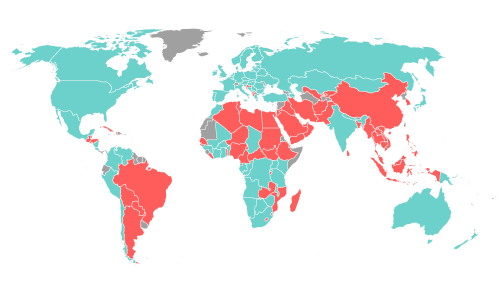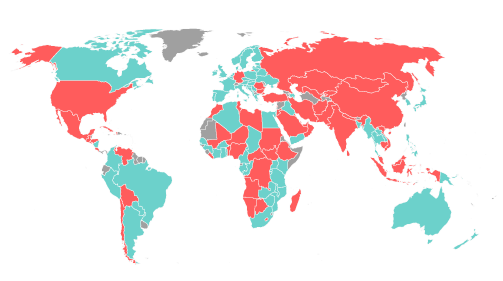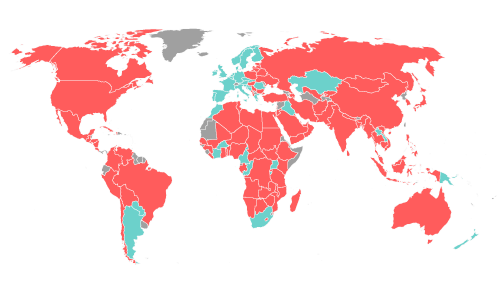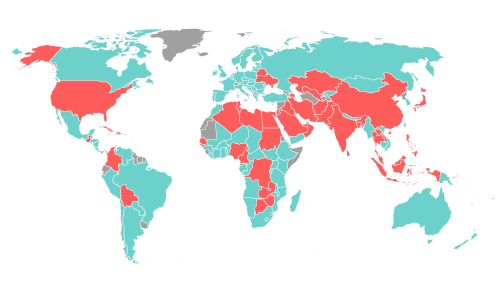The Trade Union indicator under the Labour Rights Index measures legislation regulating freedom of association, the right to collective bargaining, and the right to strike.
The indicator also measures whether the law prohibits employers from replacing workers on a legal strike.
About the Trade Union Indicator Database
The Trade Union indicator under the Labour Rights Index is based on coding the findings of selected four sources (National Legislation, ILO CEACR reports, ITUC Global Rights Index, and USDOS country reports on human rights practices) and compiling this information in a readily accessible and concise manner. The database is designed to be used both by practitioners and researchers. The country profiles provide detailed and verifiable information that can be traced back to the original textual source.
Please reference the Trade Union indicator database as follows:
WageIndicator Foundation and Centre for Labour Research. (Year of download XX). Trade Union Indicator Database. Retrieved from https://clr.org.pk/countries/. (Date accessed: XXX.)
Freedom of Association
Does the law allow workers to form and join unions of their own choice?
International Regulatory Standard
Article 2 of the Freedom of Association and Protection of the Right to Organise Convention,1948 (No. 87) states that workers and employers, without distinction whatsoever, shall have the right to establish and, subject only to the rules of the organisation concerned, to join organisations of their own choosing without previous authorisation.
Methodology
Whether the law allows Freedom of Association (FoA):
1: The legislation allows workers to form and join organisations of their own choice except for armed forces, police, and public administration workers engaged in the administration of the state.
0: There is an explicit general prohibition in law of the right to establish and join organisations, or the law prohibits more than one trade union in a single enterprise, or there is a state monopoly through the imposition of a single organisation to which workers must belong.
Workers are excluded from the right to form and join organisations of their own choice based on exclusionary criteria like race, political opinion, nationality, age or on the grounds of occupational categories (public or private sector).
The legislation places excessive requirements on the right to organise in an enterprise by setting a minimum number of workers for registration of a trade union (minimum of 50 workers) or a high percentage of workers to be union members (more than 10% of total workers).

Access to Freedom of Association
No Access to Freedom of Association
Collective Bargaining
Does the law allow workers to bargain collectively with employers through their representative unions?
International Regulatory Standard
Article 4 of the Right to Organise and Collective Bargaining Convention, 1949 (No. 98) states that measures appropriate to national conditions shall be taken, where necessary, to encourage and promote the full development and utilisation of machinery for voluntary negotiation between employers or employers’ organisations and workers’ organisations, with a view to the regulation of terms and conditions of employment by means of collective agreements.
Methodology
Whether the law allows workers to bargain collectively:
1: The legislation allows workers (except for armed forces, police, and public administration workers engaged in the administration of the state) and their representative organisations to negotiate and conclude collective agreements with employers to determine terms and conditions of employment.
0: There is an explicit general prohibition in the law of the right to collective bargaining.
Workers are excluded from the right to bargain collectively based on exclusionary criteria like race, political opinion, nationality or on the grounds of occupational categories (public or private sector) except those referred to above. There is a lack of objective, pre-established and precise criteria for determining and recognising trade unions entitled to collective bargaining. There are excessively high representation thresholds (higher than 20%) for trade unions to engage in collective bargaining.

Access to Collective Bargaining
No Access to Collective Bargaining
Right to Strike
Does the law provide the right to strike?
International Regulatory Standard
Article 11 , Convention 87 states that each Member of the International Labour Organisation for which this Convention is in force undertakes to take all necessary and appropriate measures to ensure that workers and employers may exercise freely the right to organise. Para 751 of the Compilation of decisions of the Committee on Freedom of Association, 2018 shares that while the Committee has always regarded the right to strike as constituting a fundamental right of workers and of their organisations, it has regarded it as such only in so far as it is utilised as a means of defending their economic interests. Para 754 further states that the right to strike is an intrinsic corollary to the right to organise protected by Convention No. 87.
Methodology
Whether the law allows the right to strike:
1: The legislation provides for the right to strike for workers.
0: The right to strike is not provided in law or if there is an explicit general prohibition on strikes. There are excessive exclusions based on race, political opinion, nationality, or occupational categories (public or private sector). The right is jeopardised through many Restrictions (e.g. limiting or stipulating the duration of a strike before initiation of strike action or where the list of essential services is broader than the approved list.
A requirement of more than 50% of members to be in favour of a strike is present (requirement of an absolute majority,). The legislation sets too long periods for previous negotiation, conciliation, and mediation (greater than 30 days) or unreasonable notice/cooling-off periods before calling a strike (greater than 14 days).

Access to Right to Strike
No Access to Right to Strike
Replacing Workers on Strike
Does the law prohibit employers from terminating employment contracts of striking workers?
International Regulatory Standard
Article 1 of the Right to Organise and Collective Bargaining Convention, 1949 (No.98) states that workers shall enjoy adequate protection against anti-union discrimination in their employment. Such protection shall apply more particularly in respect of actions calculated to make the employment of a worker subject to the condition that he shall not join a union or shall relinquish trade union membership; or to cause the dismissal of or otherwise prejudice a worker because of union membership or because of participation in union activities outside working hours or, with the consent of the employer, within working hours.
Methodology
Whether the law prohibits replacing workers on strike:
1: The legislation prohibits the replacement of striking workers.
0: The law does not prohibit replacing workers on legitimate and peaceful strikes,and there are excessive sanctions in case of strikes,including
imprisonment of workers.
There are excessive, disproportionate and/or penal sanctions for organising or participating in a legitimate strike, irrespectively whether the strike is lawful or unlawful under the national legislation.
